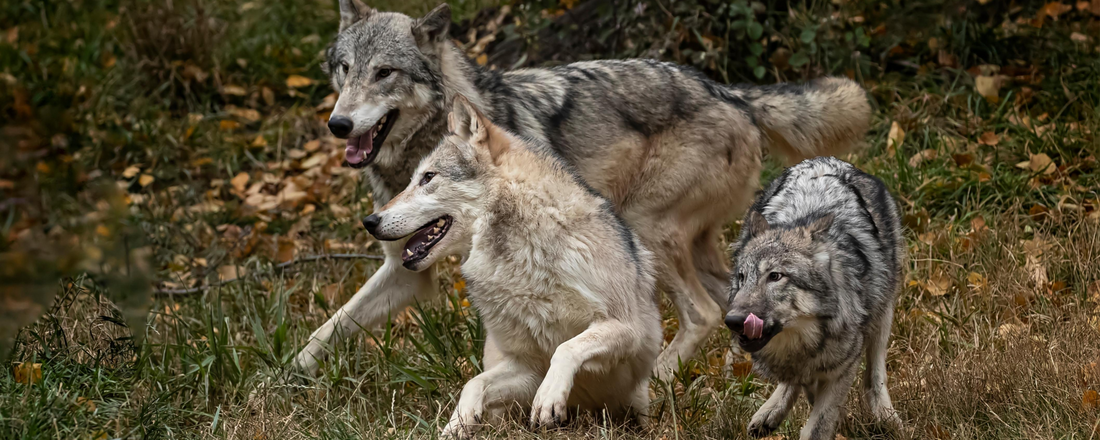As pet owners, we all want our pets to live long, happy lives. Yet, despite advancements in veterinary care, many canine companions seem to fall short of their full potential lifespan.
This article explores the fascinating connection between the natural diet of wolves, our dog's wild ancestors, and how nature utilizes ketogenic diets, fasting, and autophagy to maximize health.
 Through new advances in our scientific understanding of these natural body mechanisms we can unlock a new level of health and well-being for your beloved pet.
Through new advances in our scientific understanding of these natural body mechanisms we can unlock a new level of health and well-being for your beloved pet.
The Wolf Diet
In ratio a wolf’s diet is made up of 54% protein, 45% fat and 1% carbohydrates.

This high-fat, high-protein, and low-carb eating keeps wolves in a state wherein their bodies utilize fat instead of carbs for energy, producing efficient molecules known as ketone bodies that might even boost brain function and energy levels.
Adaptive Fasting in The Wild
 Fasting simply refers to periods of feast and famine. Wolves are opportunistic hunters who might not eat for several days if they can't make a kill. But when they do catch prey, they can eat a lot at once, sometimes up to 20% of their body weight in a single meal.
Fasting simply refers to periods of feast and famine. Wolves are opportunistic hunters who might not eat for several days if they can't make a kill. But when they do catch prey, they can eat a lot at once, sometimes up to 20% of their body weight in a single meal.Unlike domesticated pets that eat at set times, wolves have irregular eating patterns. After they feast on a successful hunt, they often go through fasting periods that can last several days until their next kill. The times that they go on without food trigger various natural body responses, including autophagy.
Autophagy: Nature's Recycling System
Autophagy, which translates to "self-eating", is a process where cells break down and recycle damaged and dysfunctional components.
Fasting and the absence of calorie can lead to the induction of adaptive autophagy and increase longevity of cells. This not only clears debris and potential toxins from cells, reducing inflammation, but also promotes cellular repair and regeneration. The process of autophagy in wolves allowes them to maintain optimal health even under dietary stress and environmental challenges. For wolves, this adaptive process is crucial for survival in the wild where food is scarce.
The process of autophagy in wolves allowes them to maintain optimal health even under dietary stress and environmental challenges. For wolves, this adaptive process is crucial for survival in the wild where food is scarce.
Insights from Human Studies
In humans, the benefits of a ketogenic diet and fasting facilitating autophagy have been extensively studied. Research has shown that these practices can lead to improved weight management, better control of blood sugar levels, reduction in inflammation, and enhanced brain health.

Similarly, fasting has been linked to improved metabolic features, longevity, and decreased risk of several chronic diseases such as cancer, largely through the activation of autophagy.
Applying These Insights to Pet Health
Todays domesticated pets have a diet that is high in carbohydrates, low in fat, and moderate in protein which is far from our dog’s ancestral diet, the ketogenic diet.
Carbohydrate is one of the top ingredients in most commercial dogfoods and is also a precursor to various diseases like diabetes. Because of this many pet owners have questioned the nutritional content of commercial dogfood thus some had made the switch to feeding their pet the natural way.

Now the question arises, for many pets, especially those with certain health conditions like diabetes, obesity, cancer, or neurological disorders: can the principles of a ketogenic diet be beneficial for pets?
Some veterinarians have begun exploring the use of ketogenic diets as a therapeutic option for these issues.
A carefully managed ketogenic diet might mimic the health benefits seen in wolves and can help improve the outcomes of pets suffering with certain diseases.
However, implementing fasting for pets, especially cats, can be tricky and potentially harmful if not managed correctly. Cats, for instance, cannot withstand starvation as they develop a severe liver condition unique to cats, known as hepatic lipidosis.

Therefore, any approach to fasting must be undertaken with veterinary guidance and should consider the species, the health status, and the individual needs of the pet.
A Balanced Approach
While it’s clear that wolves benefit from their natural eating habits, domestic pets live in a much different environment and have different nutritional needs that might not align perfectly with those of their wild counterparts.
Pet owners interested in exploring a ketogenic diet or fasting regimens for their pets should consult with a veterinarian. A professional can help tailor a plan that considers the pet's specific dietary requirements, ensuring they receive balanced nutrition that supports their overall health and wellbeing.

Moreover, for pet owners interested in autophagy, the focus should be on providing a diet that supports cellular health and longevity without the extremes of fasting, which might not be suitable for all pets. This might include a balanced diet that is rich in proteins, healthy fats, and low in processed carbohydrates, alongside regular exercise and wellness checks.
Conclusion

In the vast wilderness, where the law of nature rules, wolves thrive on a regimen that modern science has only begun to appreciate for humans and pets alike. This regimen involves a ketogenic diet, adaptive fasting, and the biological process of autophagy. Understanding how these elements work in harmony in the wild can offer insights into optimizing the health of our pets.
The interconnectedness of a ketogenic diet, fasting, and autophagy in wolves offers a fascinating glimpse into the potential for these dietary practices to influence pet health positively.
As science progresses, we continue to explore these connections, it remains crucial to prioritize the health and wellbeing of our pets through informed dietary choices and lifestyle practices.



